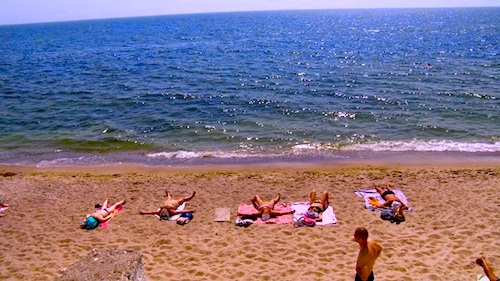Quiet in Odessa Trailer from dmitriy khavin on Vimeo.
By Joe Bendel. It has been frustrating to hear western media unquestioningly parrot the Putin propaganda line on Ukraine. Of course, that is much easier to do than actually reporting on-scene and talking to everyday Ukrainians up-close-and-personal. Fortunately, Dmitriy Khavin does things the hard way. As part of his continuing efforts to document Ukrainian cultural life and the Jewish Ukrainian experience, Khavin interviewed a diverse cross-section of Odessa’s Jewish community. Their first-hand accounts and unfiltered responses make Khavin’s Quiet in Odessa absolutely must-see viewing when it screens this Sunday at the JCC in Manhattan.
For historically painful reasons, Jews around the world have traditionally been leery of nationalism. However, the recent crisis has brought out new found feelings of patriotism in Khavin’s interview subjects, who now more readily self-identify as Ukrainians and Odessans, as well as Jews. In one case, a young Jewish Odessan has indefinitely postponed making Aliyah out of solidarity with her fellow Ukrainians.
Khavin also talks to older Jewish Odessans who, much to their own surprise, volunteered for the civilian Self-Defense Brigade. Despite their age, they are still not to be trifled with. They also represent the country’s inclusiveness, serving shoulder to shoulder with Catholic and Orthodox comrades, as well as at least one Georgian. (In fact, Ukrainian-Georgian diplomatic bonds have grown stronger at all levels, due to their unfortunate shared experiences with Putinist Russia.)
Probably the greatest revelation though, will be the surprising ties many Jewish Ukrainian have forged with Right Sector, Putin and the American media’s favorite bogeyman. In a particularly telling episode, Odessa’s senior rabbi relates how the leader of Right Sector came to him to apologize for a rash of anti-Semitic graffiti, disavowing any involvement, but pledging his group’s support painting over the provocations the following weekend. It is exactly the sort of story that should be reported, but isn’t.

There is also a good deal of humor in Quiet, much of it coming from the old timers at the city’s venerable bathhouse, who joke about their Jewishness in terms that would raise the eyebrows of old school borsch belt comics. Just as importantly, Khavin also conveys a vivid sense of Odessa’s old world charm and sophistication. It seems like a very livable city to call home—and a place worth fighting for.
You really have to respect Khavin’s go-and-report approach to filmmaking. He puts a very personal face on people the news media prefers to cover with broad stereotypical strokes. Yet, his micro focus yields macro insights. Frankly, this is a film that needs to reach a mass audience rather urgently. It is timely and informative, but also consistently engaging, supported by a subtle but elegant soundtrack, featuring Uri Cane and vocalist Sofiya Leavsie. Very highly recommended, Quiet in Odessa screens this Sunday (11/2) at the JCC in Manhattan. It also screens at Brooklyn’s Central Library on November 20th as part of a double bill with Khavin’s eye-opening The Territory.
LFM GRADE: A
Posted on October 30th, 2014 at 12:14pm.